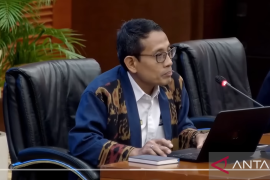"Currently, the world is faced with a catastrophic threat, its impact and its consequences are climate change. We have seen various studies that show that the impact of climate change will be enormous," the minister remarked during the Climate Change Challenge webinar organized by the University of Indonesia (UI) here on Friday.
Indrawati drew attention to the impact of climate change in various parts of the world, including the melting of ice in the north and south poles as well as drought and prolonged rains.
Even if we refer to the report used as a reference in the global climate change meeting, today, the global temperature is recorded at 1.1 degrees Celsius, warmer than that during the pre-industrialization period.
According to this study, even if all countries implement their Nationally Determined Contribution (NDC) in the Paris Agreement to reduce carbon emissions, the rise in temperature would be inevitable.
"The global temperature will continue to increase to 3.2 degrees Celsius as compared to the pre-industrial period in 2030. This means the world will pass the maximum temperature increase limit that the earth can withstand, between 1.5 to two degrees Celsius," the minister expounded.
Given the COVID-19 pandemic that has battered even developed countries, the minister stressed on the importance of the contribution and commitment of all countries to reduce carbon emissions.
"We need more ambitious targets. Hence, we continue to align policies to achieve that (Paris) commitment or even be more ambitious," she stated.
Indrawati noted that as a large country, Indonesia was urged to play an active role in the international community in seeking commitments from neighboring and developed nations for the resources required to transform high carbon to low carbon or even zero carbon emissions.
The minister pointed to the crucial roles of several sides, including the Ministry of Environment and Forestry (KLHK), through its efforts to fight deforestation that have yielded positive results by obtaining CO2 reduction compensation funds, including a strategy in the renewable energy sector that targets the New Renewable Energy (EBT) mix to reach 23 percent by 2025.
Meanwhile, the environmental issues to be addressed comprise reducing carbon emissions and the Paris Agreement commitment as the priority agenda number six in the 2020-2024 National Medium-Term Development Plan (RPJMN).
Related news: Indonesia needs US$247 billion to achieve Paris Agreement's target
Related news: Government should review VAT imposition plan on basic needs: DPR
EDITED BY INE
Translator: Kuntum Khaira Riswan, Katriana
Editor: Fardah Assegaf
Copyright © ANTARA 2021











